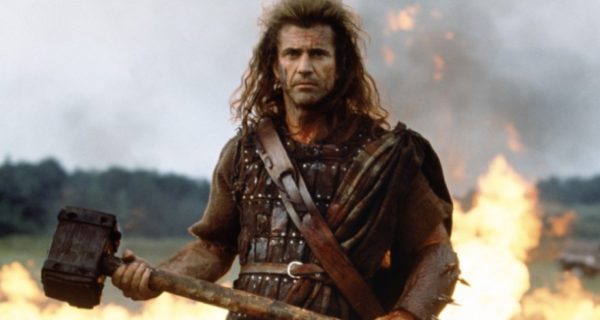Earlier this year, I watched “Braveheart” fully through for the second time. Random assembled notes:
1. The beginning was fair because it was in touch with deeper emotions. The end was fair because it was in touch with deeper inspirations. The middle, however, felt like it wanted to be an action epic so badly that it sacrificed the best it had to offer – I felt pretty disconnected from the characters and their motivations. We rarely get inside the heads and hearts of the protagonists. The notion of “freedom” felt ill-explained, as did the vision for Scotland’s future, which seemed solely hinged upon just getting rid of the English, but not much beyond that. It was more about Wallace and his vengeance campaign, as opposed to an actual ideal for the generations to come.
2. William Wallace, I find, is actually a fairly unlikable character most of the time. One could chalk this up to trauma, but it’s not a deeply explored sort of trauma. I think it’s more that he feels rather flat and skin-deep in his thoughts and actions. What you see is what you get, and that’s about it. Despite the emphasis on brains as opposed to brawn at the beginning of the film, for most of the rest of it, he is made out to be a blue-painted, blood-thirsty, superhero avenger as opposed to a man of education and consideration. Indeed, he becomes more 2-dimensional after the death of his wife, Murron (who, in my opinion, was the single best part of the film), and I don’t just mean that he becomes embittered, but that the writing itself actually suffers from her loss.
3. All of the English characters are basically blanks, with the hologram of “villain” stamped on them. Thus, the film feels woefully lopsided and, as a result, boring. There are no surprises about these characters, nothing new for us to learn about them after the first few minutes of their screen time. They’re not real people with real motivations, just bad-guy zombies with cool outfits who look like they’ve bathed more often than the Scots (who seem to perpetually need soap and hair conditioner). This results in the entire conflict being robbed of its nuance and, therefore, its power.
4. I found myself sympathizing more with those trying to actually negotiate instead of yelling, throwing sharp weaponry, and pulling up their kilts. At least they were demonstrating some intelligence in weighing out the realities of the situation, as opposed to running on what appeared to be a private grudge on the part of Wallace. Actually, the whole Battle of Stirling made me feel kind of adrift and apathetic about who was doing what. But maybe that’s just because my historical mind knows that medieval conquests were pretty much universal by medieval kings and that Longshanks was far from alone in this, so it’s not as morally clear-cut as the movie paints it?
5. Was it just me, or did the treatment of the two gay characters, based on the story of Edward II and Piers Gaveston, leave anyone else with an eerie feeling; like the film director wanted you to interpret them as basically a “waste of space” who shouldn’t get any sympathy at all, and who should be contrasted as useless milksops in comparison with uber-macho Mel? And the window scene… the tone was just disturbing, especially in that apparently it was meant to be some sort of dark humor?
6. The entire “love of a princess” subplot was soooo pointless (not to mention woefully historically inaccurate), and added to my further sense of disconnection from Wallace; whose entire moral compass seemed tied to his singular love for Murron. It was a silly pitch to make more people stick around for a sex scene with a brawny, grubby Highland dude. *sighs*
7. Why, oh why, does Mel always overplay the whole “I am a man of peace” deal (you go, Patriot!) when we know from the get-go that he’s gonna be ‘super-rebel’ in no time at all?? And historically, yes, the English killed Wallace’s wife, but as a reprisal for his rebel activities, which were already in progress.
8. The whole “prima nocta” thing… so how exactly does having sex with a girl for one night make her incapable of having kids with her husband afterwards? How the heck does that “out-breed” the Scots? Furthermore, there’s no way on earth that would have worked out in any formal law code without heads flying instantaneously. So, sure, creepy lords would take what they wanted from the commoners, but behind the scenes, not all fancy pen signed and sealed up with an official bow.
9. Why did they make Robert Bruce into a jerk?? Why?? Yes, he was a noble fighting for the preservation of his lands and titles, but there was nothing really odd about that in the era. In the Middle Ages, the notion of “nation” had not even really been established yet; it was just kings and lords and their parcels of land and the people who owed them fealty. There was no reason to go on and on praising Wallace – who was, in many instances, more of an impulsive head-hacker – at the expense of Bruce, who had the background to lead in an official political sense.
10. Too much dumb humor. Too much gore – seriously, we would have gotten the point without as much of the visuals! Unnecessary modern swearing. And… was I the only one who imagined Bruce getting accidentally impaled when redhead McMuffin flung that sword in the air at the end? Gravity, and all, y’know. Also, did anyone ever have skin irritation from all that blue gunk they smeared on their faces? Neutrogena, here we come!
11. Nicer thoughts: Beautiful music score. Nice Celtic scenery. Appreciate the Catholic imagery laced throughout, and a reminder to all of us about the contributions made by underwear to wider civilization!

